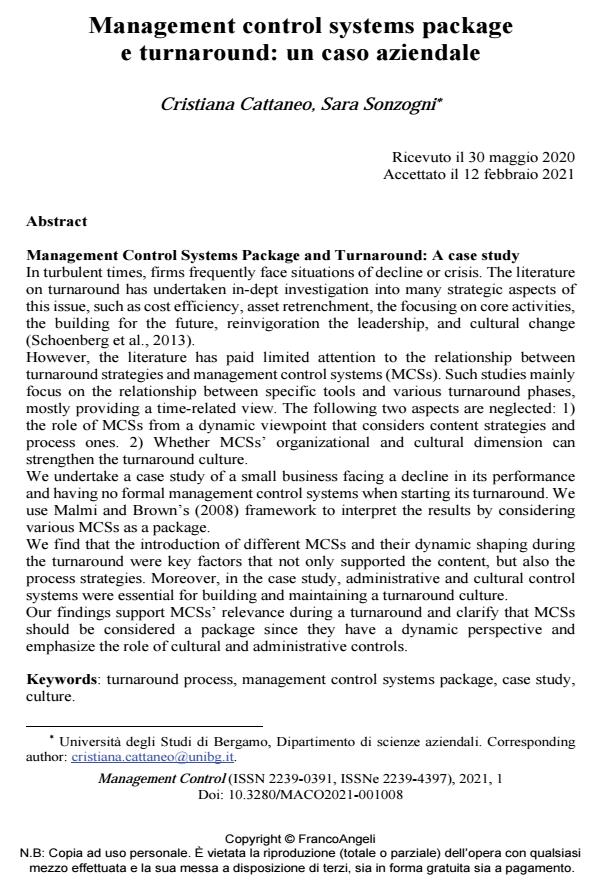Management control systems package e turnaround: un caso aziendale
Titolo Rivista MANAGEMENT CONTROL
Autori/Curatori Cristiana Cattaneo, Sara Sonzogni
Anno di pubblicazione 2021 Fascicolo 2021/1
Lingua Italiano Numero pagine 24 P. 151-174 Dimensione file 443 KB
DOI 10.3280/MACO2021-001008
Il DOI è il codice a barre della proprietà intellettuale: per saperne di più
clicca qui
Qui sotto puoi vedere in anteprima la prima pagina di questo articolo.
Se questo articolo ti interessa, lo puoi acquistare (e scaricare in formato pdf) seguendo le facili indicazioni per acquistare il download credit. Acquista Download Credits per scaricare questo Articolo in formato PDF

FrancoAngeli è membro della Publishers International Linking Association, Inc (PILA), associazione indipendente e non profit per facilitare (attraverso i servizi tecnologici implementati da CrossRef.org) l’accesso degli studiosi ai contenuti digitali nelle pubblicazioni professionali e scientifiche.
In turbulent times, firms frequently face situations of decline or crisis. The literature on turnaround has undertaken in-dept investigation into many strategic aspects of this issue, such as cost efficiency, asset retrenchment, the focusing on core activities, the building for the future, reinvigoration the leadership, and cultural change (Schoenberg et al., 2013). However, the literature has paid limited attention to the relationship between turnaround strategies and management control systems (MCSs). Such studies mainly focus on the relationship between specific tools and various turnaround phases, mostly providing a time-related view. The following two aspects are neglected: 1) the role of MCSs from a dynamic viewpoint that considers content strategies and process ones. 2) Whether MCSs’ organizational and cultural dimension can strengthen the turnaround culture. We undertake a case study of a small business facing a decline in its performance and having no formal management control systems when starting its turnaround. We use Malmi and Brown’s (2008) framework to interpret the results by considering various MCSs as a package. We find that the introduction of different MCSs and their dynamic shaping during the turnaround were key factors that not only supported the content, but also the process strategies. Moreover, in the case study, administrative and cultural control systems were essential for building and maintaining a turnaround culture. Our findings support MCSs’ relevance during a turnaround and clarify that MCSs should be considered a package since they have a dynamic perspective and emphasize the role of cultural and administrative controls
Parole chiave:Turnaround process, management control systems package, case study, culture.
Cristiana Cattaneo, Sara Sonzogni, Management control systems package e turnaround: un caso aziendale in "MANAGEMENT CONTROL" 1/2021, pp 151-174, DOI: 10.3280/MACO2021-001008